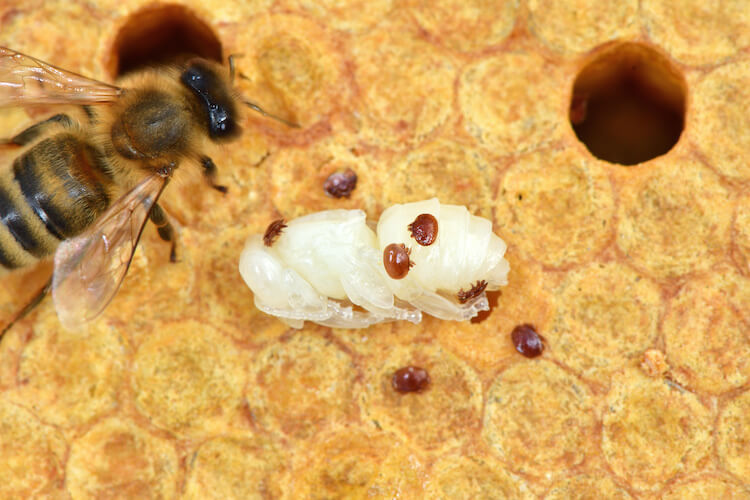Varroa Mite In Australia
Varroa Mite (Varroa destructor) has been detected in New South Wales.
The situation of the varroa mite has now transitioned into the management phase.
The National Varroa mite emergency response has been working tirelessly towards the agreed goal of eradication since June 2022.
The focus of the response has now shifted to transitioning to management of Varroa Mite.
As endorsed by the Consultative Committee on Emergency Plant Pests (CCEPP) and agreed by the National Management Group (NMG).
This transition will take time and we will continue to update you as the plan progresses.
The aim of the transition to management program is to work to increase resilience and capacity to manage Varroa mite within the Australian honey bee industry.
This will then help minimise ongoing impacts of Varroa mite naturalisation on the bee industry and pollination reliant industries.
This will occur through slowing the spread, building industry resilience, provide management options and supporting pollination security.
What Happens now?
In this interim period, NSW DPI will immediately cease mandatory euthanasia of hives in what were eradication emergency zones (red zones).
Beekeepers still located within those zones will be able to opt in for euthanasia and ORC if they wish.
The Surveillance Emergency (Purple) zones will cease, as will any of the smaller regional outlier Eradication Emergency (Red) zones.
This includes; Gumble, Cuttabri, Somerton, Harparary, the southern pollination zones, Coffs Harbour area including Nana Glen.
These will join the previous General Emergency (Blue) zone to become the Suppression Zone.
The Red zones in the Kempsey, Hunter and Central Coast regions become Management Zones.
How to do your part
If you are located in NSW:
Ensure all of your hives are registered with the DPI:
If unsure you can register here:
https://www.dpi.nsw.gov.au/animals-and-livestock/bees/beekeeper-registration
If you see anything suspicious use the online form at www.dpi.nsw.gov.au/hives
Send an email to [email protected]
Or call the Exotic Plant Pest Hotline 1800 084 881.
Check what you can and cannot do in the supression zone and the movement zone here:
https://www.dpi.nsw.gov.au/emergencies/biosecurity/current-situation/varroa-mite-emergency-response
There is now a Hive Movement Declaration. For more information click on the link:
Varroa Mite Testing – Sending Results to NSW DPI
All beekeepers in NSW are now instructed to test their hives every 16 weeks to detect varroa mite in hives.
Regardless if you detect varroa mite or not, it is mandatory to report your findings every 16 weeks.
You can report your findings here:
https://forms.bfs.dpi.nsw.gov.au/forms/13537
If you are located outside of NSW:
Ensure all of your hives are registered:
QLD: https://www.business.qld.gov.au/industries/farms-fishing-forestry/agriculture/niche-industries/beekeeping/hive-registration
SA: https://pir.sa.gov.au/biosecurity/animal_health/bees/beekeeper_registration
NT: https://nt.gov.au/industry/agriculture/livestock/honey-bees-and-beekeeping/register-your-bee-hives
WA:https://www.agric.wa.gov.au/livestock-biosecurity/registering-owner-stock-or-beekeeper
Important Message for QLD Beekeepers:
The QLD Department of Agriculture and Fisheries are asking Queensland beekeepers to test their hives for Varroa Mite.
This is due to the borders re-opening to all those that hold a permit to take bees from NSW and entering QLD.
For more about permits, visit here.
*You must follow all permit conditions — penalties apply.
Varroa Mite Test Kits
You can buy a Varroa Test Kit for $10.95 in store or online here
This test kit is a alcohol wash kit.
Simply place bees and alcohol (e.g. methylated spirits) into the jar and shake.
The Varroa Mite will detach from the bee and into the bottom of the jar.
(Instructions are included)
Reporting Your Varroa Mite Checks in QLD
Report your tests to Bee 123 online form even if they come up with no Varroa Mite.
If you find any trace of Varroa Mite in your hives please report immediately to either:
Biosecurity Queensland on 13 25 23
The Exotic Plant Pest Hotline on 1800 084 881.

For more information on Varroa Mite, visit the NSW DPI website or the Business QLD website
